Wondering how we’re progressing with regards to a save and effective vaccine? We are too. Here’s the latest.
Vaccine Watch
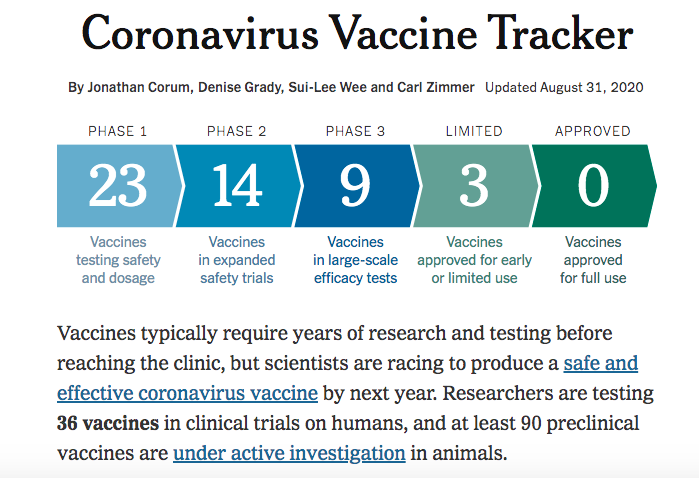

Wondering how we’re progressing with regards to a save and effective vaccine? We are too. Here’s the latest.
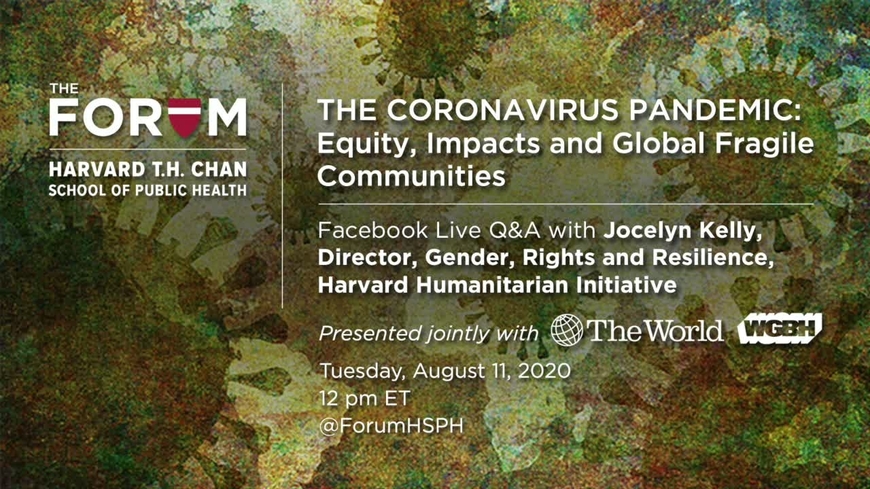
Dr Jocelyn Kelly, Director of the Program on Gender, Rights and Resilience at the Harvard Humanitarian Initiative, discussed the Coronavirus Pandemic and how it has impacted some of the world’s most vulnerable populations during this Facebook Live Q&A with The World’s Elana Gordon. She also gives a shoutout to the work we are doing to #freethevaccine! Check it out now!
You still have a little time (until end of day on Sept 1st!) to join the amazing crew of hundreds of students, designers, advocates and many others around the world who want to help end this darn pandemic through creativity and community. Submit your application now.
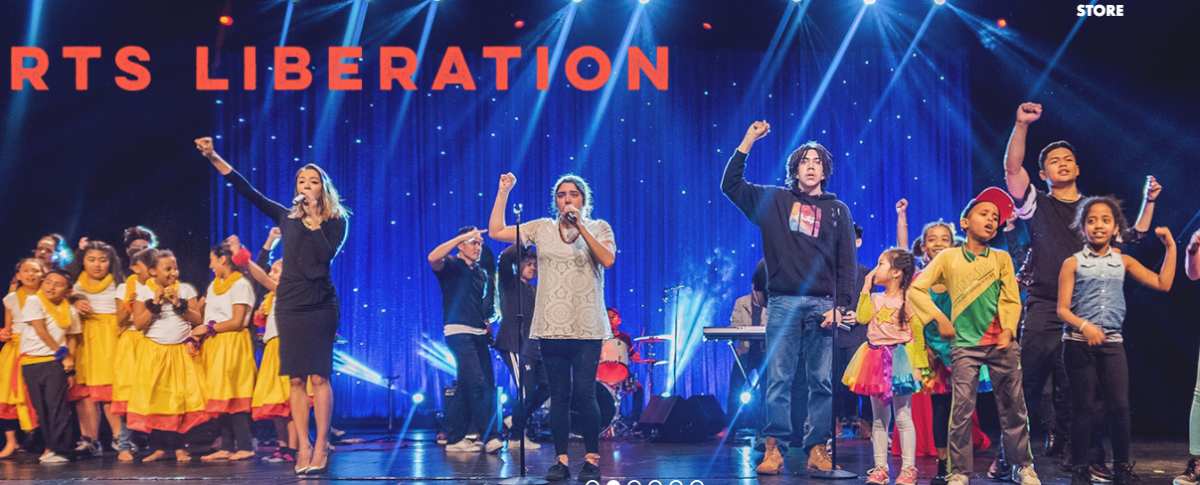
Our friends at Arts Corps, under the leadership of James Miles, will be joining the UAEM and C4AA teams as an official partner organization for this next Season 2 of Free the Vaccine! The onslaught of the COVID-19 virus has shown to disproportionately impacts black and brown students, students whom have already been disregarded by society. The work of Arts Corps is to ignite the power of youth voice and provide them with opportunities to have agency/be part of the solution, and work together to create a better, more equitable place for everyone.
Some of you may know James for his TedXSeattle Talk Why Education Needs Hip Hop and many of you know him for his workshops with UAEM which inspired students to develop these memes, songs, and videos to explain the failures of biomedical R&D systems. (you know how many slides this normally takes?)
world.
James Miles: Why are we here? Community. Bringing people and seeing people together that make the air around you crackle.
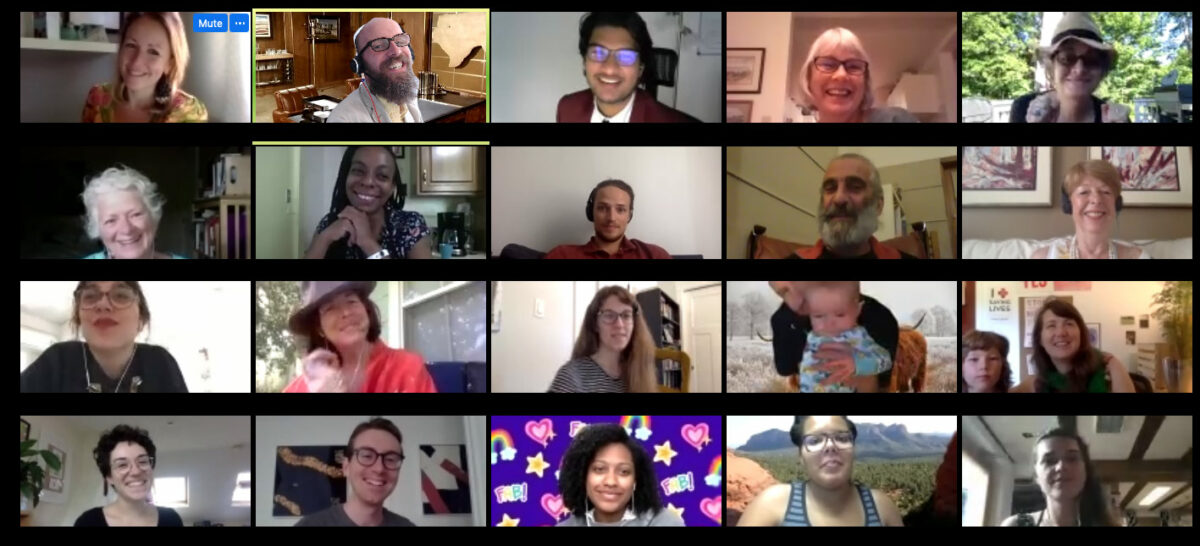
Free the Vaccine for COVID-19 is looking for the right candidate to join us as a Campaign Manager for Season 2 of our campaign!
Help us get the word out! If you know someone who would be a good match, please pass the application along!
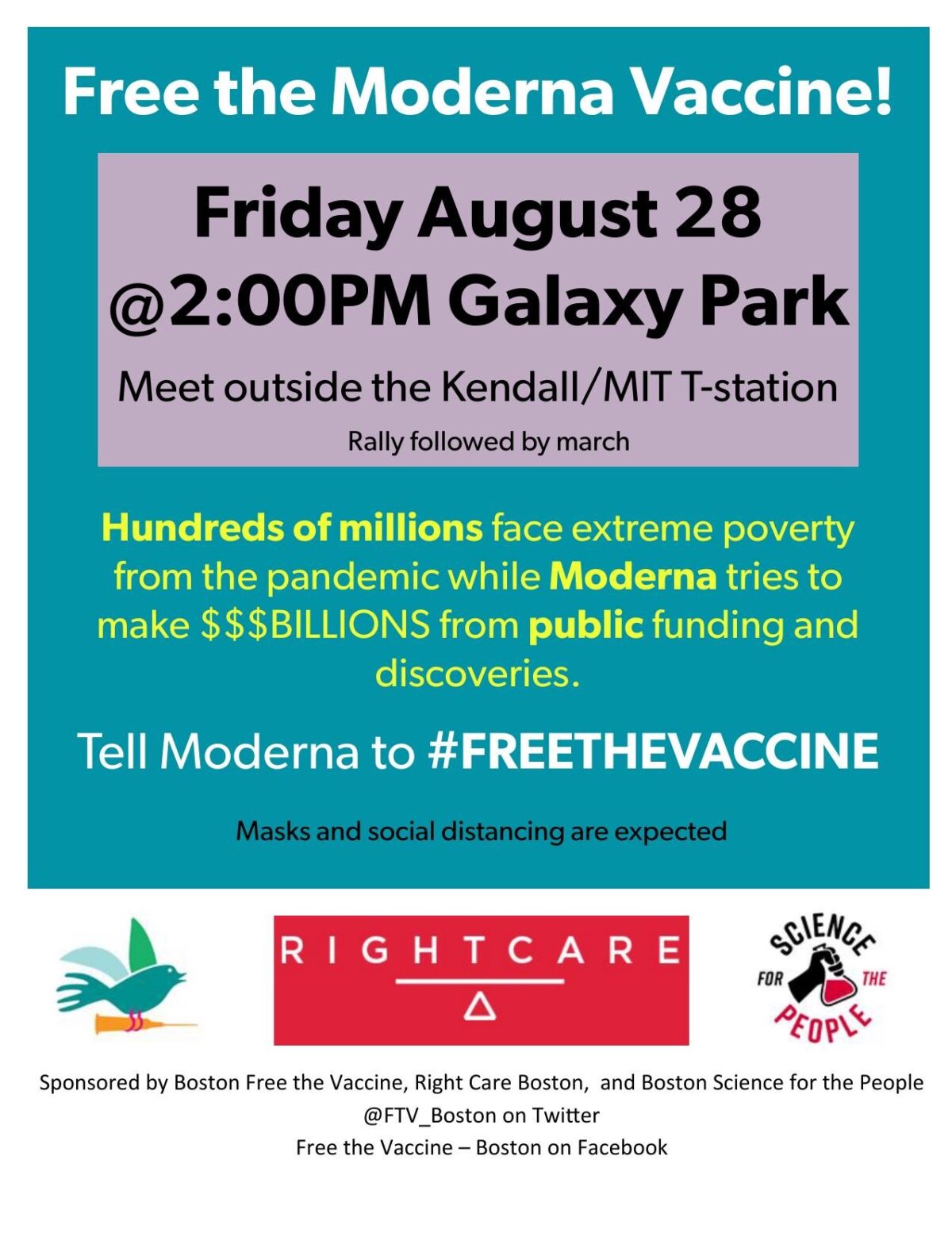
The Free the Vaccine for COVID-19 Campaign, led by Universities Allied For Essential Medicines and the Center For Artistic Activism, is calling on Moderna Sciences to make the Open Covid Pledge which would commit any relevant intellectual property to be made available globally via open access licenses, and to price their vaccine at cost to ensure global access and equitable distribution to protect the world’s most vulnerable peoples.
Moderna recently announced that taxpayer money funds 100% of its work to bring a COVID-19 vaccine to licensure, yet they still plan to rake in billions charging the highest price yet announced for a potential vaccine. It was also recently discovered that the U.S. government may co-own their vaccine candidate making this innovation truly the People’s Vaccine, and not another private commodity to be price gouged at will.
Join FreeTheVaccine and allies on Friday, August 28th at 2PM at the Kendall Square MBTA Station and on FTV_Boston’s FaceBook live to demand the following:
Fair and affordable pricing of the COVID-19 vaccines and drugs currently under development has the potential to save millions of lives. WE THE PEOPLE HAVE ALREADY PAID ONCE for the research and development of these products.
If its new vaccine proves to be safe and effective, Moderna will have a choice to make. They can prioritize the interests of shareholders and executives thus furthering the destructive nature of this virus—or lead the way in fighting the defining health crisis of our generation.
For more information, reach out to the Boston Regional Free the Vaccine for COVID-19 Organizers at bostonfreedomvaccine@gmail.com.
More information can be found at the facebook invite here if you’re into that.
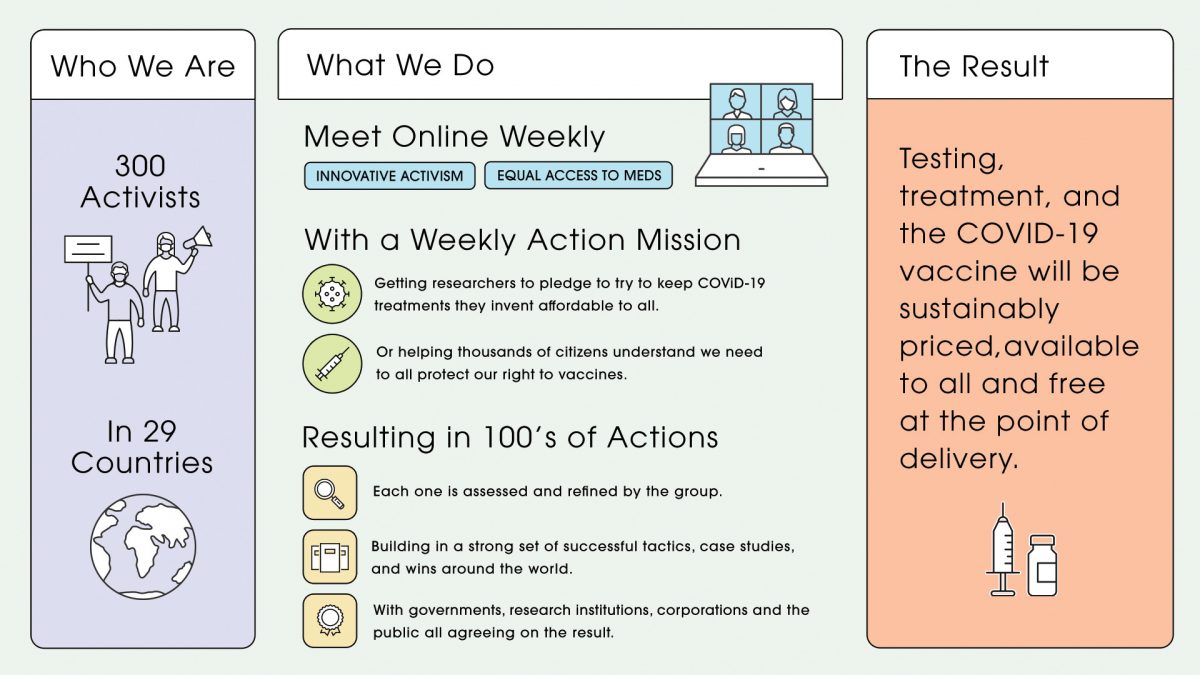
DEADLINE EXTENDED!
UNTIL SUNDAY SEPT 6, 11:59 EDT
Apply by filling out this form by Sept 6th 11:59pm EDT.
Returning collective members, please fill out the above form also!
More details on below.
Our campaign aims to ensure that publicly-funded diagnostic tools, treatment, and the COVID-19 vaccine will be sustainably priced, available to all and free at the point-of-delivery. We are finding new ways to achieve this through leveraging creativity, culture, as well as tried and tested organizing and activism in our Advocacy Innovation Lab.
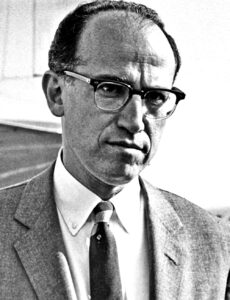
We are a global collective with hundreds of members from dozens of countries. We meet regularly and plan and execute creative campaigns. We have already completed one 16 week round of organizing and actions with our focus on the over $11 billion of public funds already invested in pharmaceutical R&D at universities for COVID-19. Changing the way these universities patent and license their research is a critical lever that can prevent pharmaceutical monopolies and increase access to life-saving medicines across the globe.
Find more information, past projects, and more at freethevaccine.org/about
Think of a book club – small groups of smart people sharing a common interest. In this case, our focus is changing the way the biomedical research and development (R&D) system and the we research and deliver medicines. And we don’t just talk about it over tea, we are taking action. As a member of the collective, you’ll be in a small “Salk Squad,” named after virologist, Jonas Salk, who refused to patent or profit off his polio vaccine. Squads are supported throughout the process with training and structures to learn artistic activism, and the history and theory behind the access to medicines movement.
You will meet people all over the world who are working so COVID tests, treatments and vaccines are affordable and accessible to everyone, everywhere. A lofty goal we know but an important one. You’ll meet online to hatch plans, access videos and other training materials, and put together your own plan based on the skills and interests of your team. The whole experience is about learning new skills, getting things done, and having fun with an amazing community of people.
We come from all sorts of backgrounds – some with no experience with these issues, some with lots. There are creative people, and people who don’t think of themselves as creative when they start. We’ve had pharmacists, dancers, front-line workers, graphic designers, hollywood hairstylists, and students. There are adults of all ages, and from all over the world. All of them did great work.
We’re especially focusing recruitment for Season 2 on these universities and regions:
But if you don’t see your location or university listed, please do apply anyway. We need passionate people from everywhere.
Around 4 hours a week. Like a book club, those hours are mostly flexible and on your timeline, in addition to one or two short, entertaining (we’ve been told) group meetings a week where we learn, plan, and get things done.
“Free the vaccine has given me the hope, structure, and accountability I need to put my skills to use.”
“While we’re results driven, I also feel a genuine sense of team love and pride – something very hard to do virtually. (Kudos!)”
“There was a real feeling of being connected to a large, engaged, creative, active network!”
“The meetings were the highlight of my week.”
There are two ways to take part and join in this fun, important work.
☟ THIS IS NEW ☟
Lend a hand to the campaign a few hours a month. In order for us to be able to plan and accomplish our objectives, we ask our regular participants to commit to regular meetings and at least 4 hours per week. However, for those who can’t manage that but still want to contribute, the Free the Vaccine for COVID-19 newsletter provides weekly updates on the campaign, including weekly actions. The actions of the week could be:
Supporters commit to around four hours a month lending a hand to the campaign and reporting back on the results on the freethevaccine.org site.
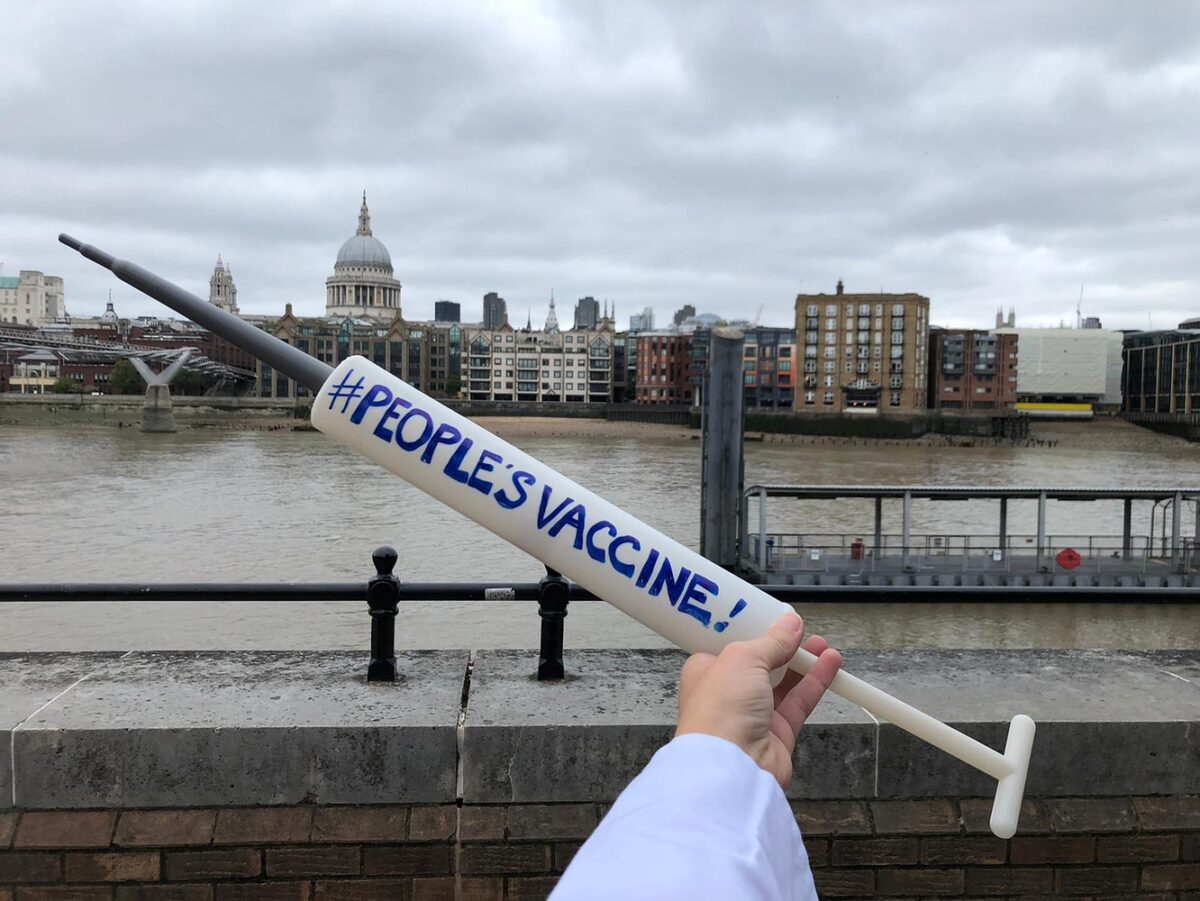
If you read this newsletter, we have two things to say. One, we love you! And two, we want to know what you love.
Has a particular Free The Vaccine action inspired you? Do you wake up every Friday excited for the Special Bonus Content in this newsletter? Would you like to see a deeper dive into vaccine-related news, or into our participants’ crafting process? Do you think we should be taking to the streets—like we did in our London Carnival March—more often?
We want to hear from you, and you can email us at info@freethevaccine.org!
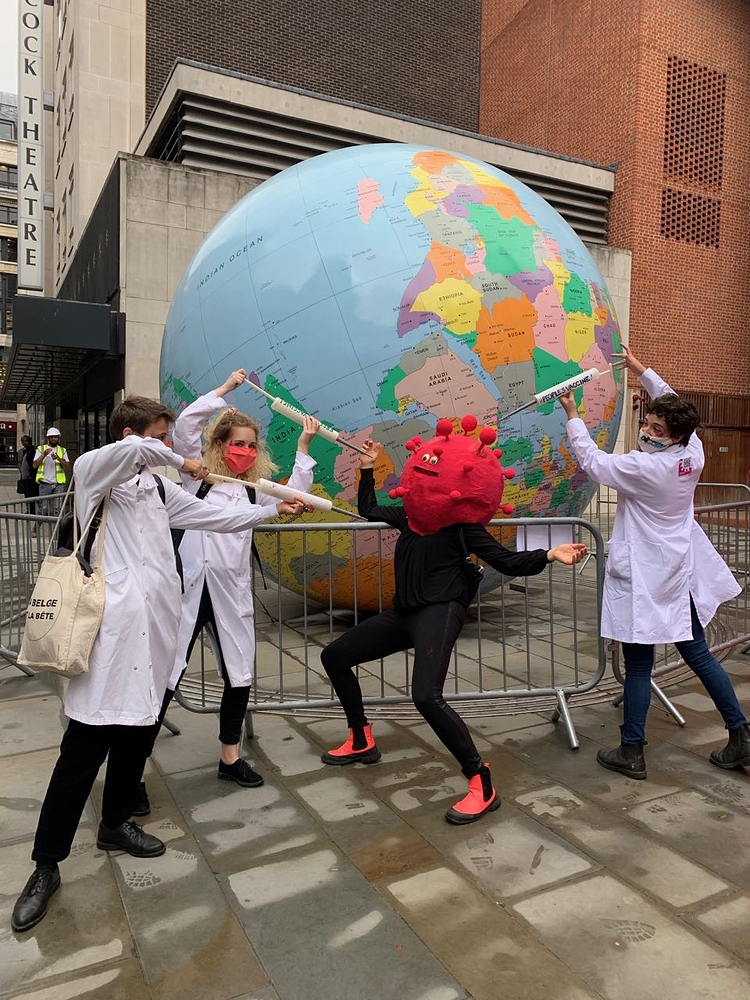
The Seal Lab organized this incredible march of 30 demonstrators—the maximum number allowed to gather—in London this past week! From the creative costumes to the brilliant UAEM banner, we’re seeing so much inspiration for future demonstrations. Check out the video and share with your friends!
The march was covered by the BBC (listen to the recording here) as well as in The Telegraph:
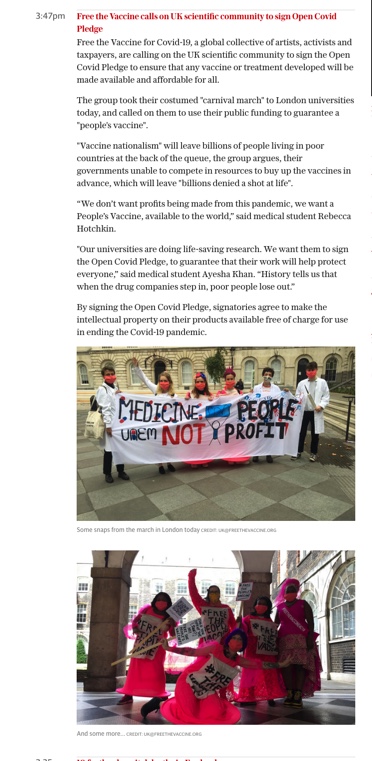
And everyone had a great time, as you can tell from the pictures below!
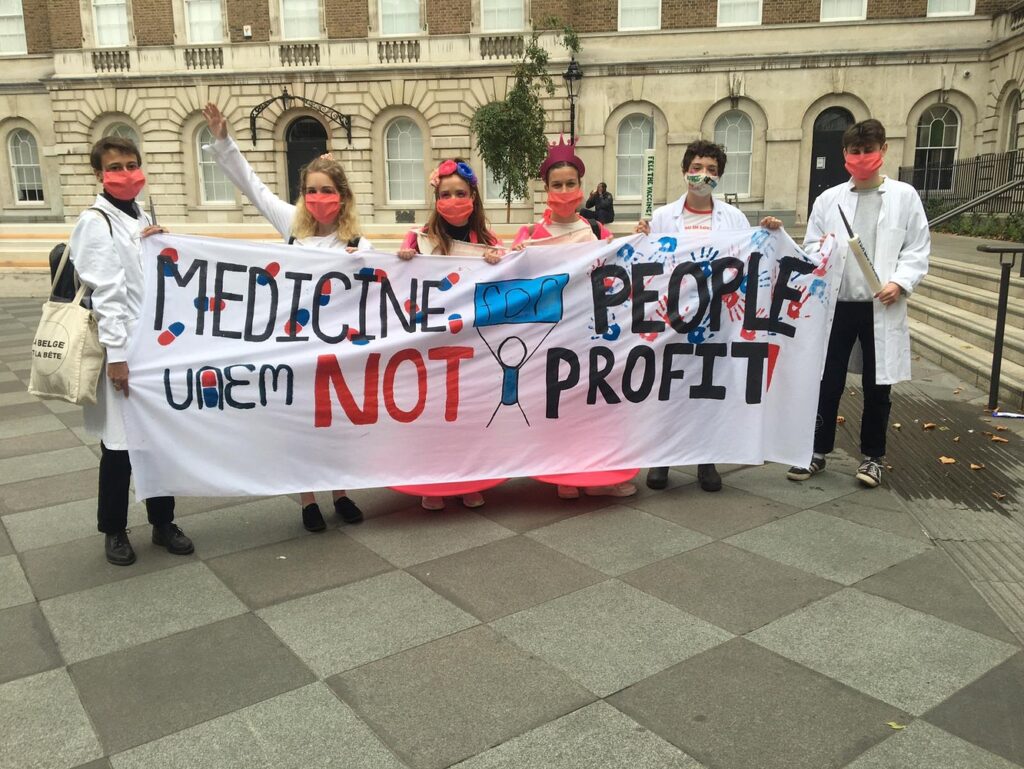
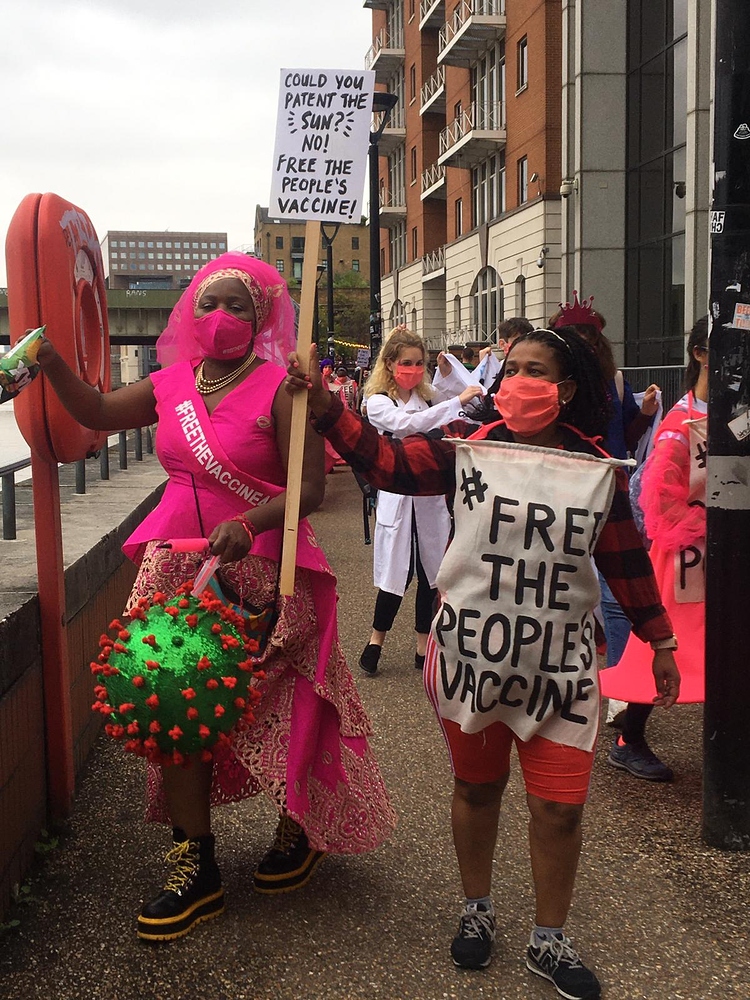
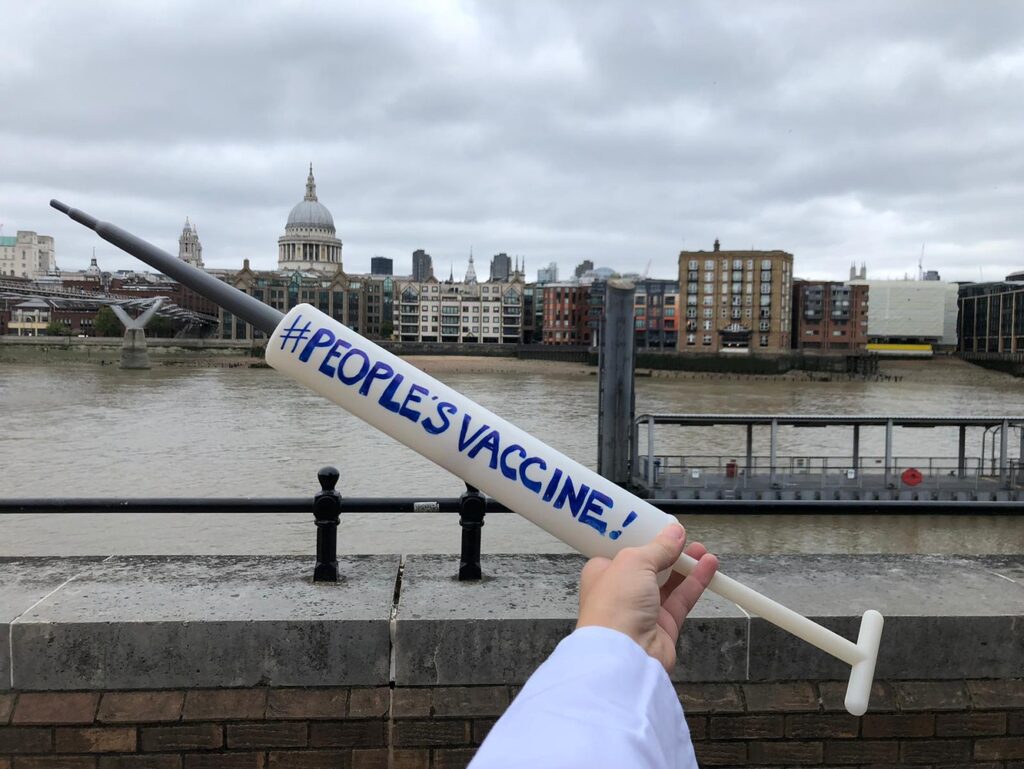

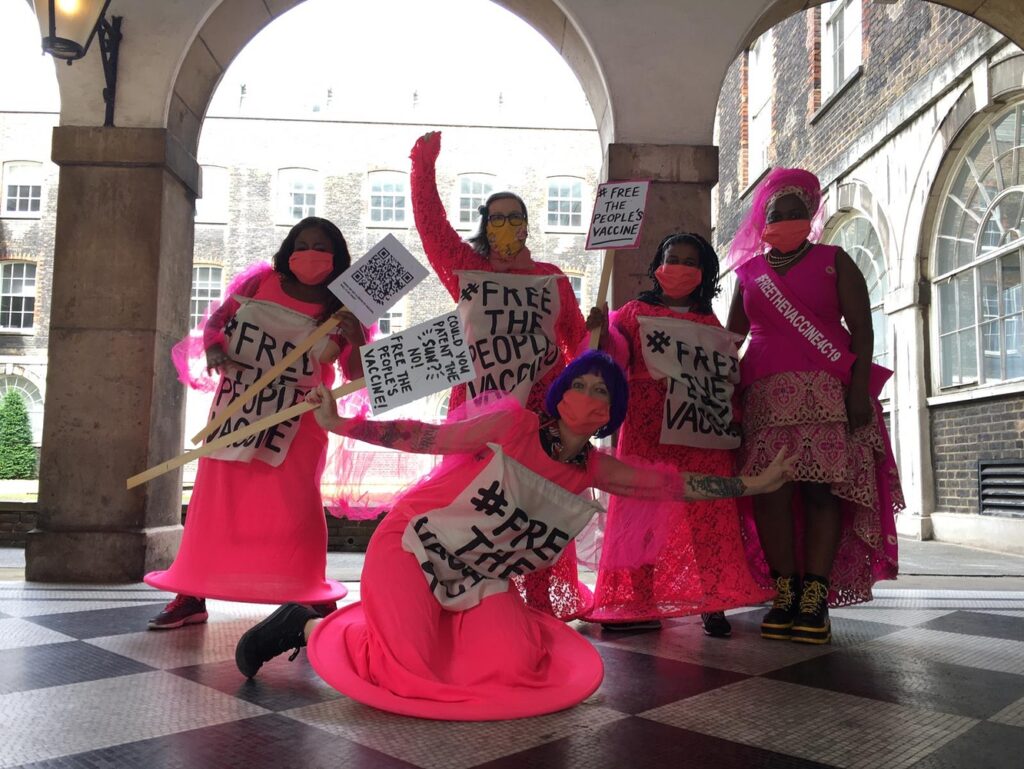
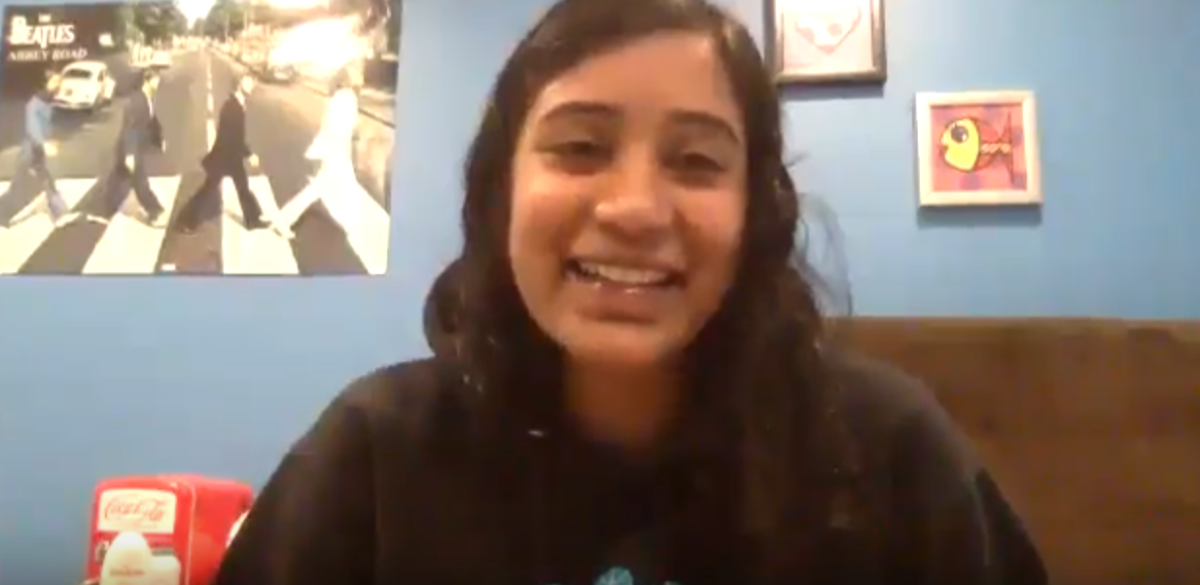
This week, we’d like to introduce you to two more members of our wonderful Free The Vaccine community: Izzy Levine and Mahima Arya, who are both from New Jersey! Izzy and Mahima are members of the Fox Lab, which is comprised of activists mostly from the Eastern part of the United States. They’ve been working to target the University of Pittsburgh!
A psychology student at McGill University, Izzy has helped to build up the McGill chapter of Universities Allied for Essential Medicines, and has years of experience in the access to medicines movement; she was instrumental in getting McGill to adopt UAEM’s Global Access Licensing Framework. Izzy is a musician and artist, and has traveled as far as Guatemala to work on public health issues!
A recent graduate who studied Information Systems and Human-Computer Interaction at Carnegie Mellon University, Mahima is passionate about accessible and inclusive technology. She loves to travel, and she once traveled solo in Cambodia for a week and visited Angkor Wat!
Now that you’ve met Izzy and Mahima, read on for what they’ve learned so far and what they’d like to share with fellow activists! This portion of their interviews have been condensed slightly for ease of reading.
Izzy: The obvious answer is that because I was involved in UAEM, and haven’t been at school for a while, this was a great way to continue to do UAEM-related stuff. But I think it felt like a really important moment–UAEM’s been working on drug pricing and access to publicly-funded research for years, but all of a sudden it feels like a time where [the issue] wouldn’t be as niche. So many people recognize how important it is that COVID drugs be accessible and affordable, so it felt like a great time to hop on board!
Mahima: A close friend of mine is really into public health, and since I have no experience in this space, I thought it would be a good opportunity to get familiar with the area. I also think that the accessibility and affordability of medicines ties so directly into inclusivity as a whole, and I feel like that’s work that I’ve done, and so it makes sense that this would be work that I also feel strongly about.
Izzy: Because a lot of this work includes spreading messages about access to medicines to the general public, sometimes the messages can be really wordy and seemingly complicated, which scares people off and makes people think at first glance that this is not a social justice cause. Being able to write about access to medicines issues in a way that is clear and makes it—like Mahima said—clearly about inclusivity and equity in general has been a useful skill.
Mahima: Knowing some design tools has come in handy when we’re putting those words into graphics!
Mahima: The importance of making the message relatable. For us, since we’re doing work in Pittsburgh, that’s the place where Jonas Salk discovered the polio vaccine and made it accessible for everyone. So we’ve been reaching out to Pittburgh residents and relating the campaign back to that message. We’re trying to make it more digestible and easy to relate to.
Izzy: It’s easy to forget, when we’re in the middle of it, that not everyone recognizes how important this is. So… being okay with using very odd methods of getting people’s attention, that might feel too bizarre or extreme at first glance. Kooky ways to stand out and get your message across are never a bad thing! That is a useful lesson, I will say.
Mahima: I’ll say two things. First, reading what Izzy had written was very helpful for getting me up to speed on what the whole movement is! Second, Elin and I worked on postcards to Pittsburgh together, and for those postcards, Elin came up with the idea to make our slogan “bridge the gap,” which was a play on how Pittsburgh has so many bridges. And I think that was a really cool idea, especially coming from her, since her knowledge of Pittsburgh is minimal.
Izzy: Since then that’s become our brand. “Bridge the gap.” The coolest skill I’ve learned has been from Mahima—design stuff. My tech skills lack in certain areas, so especially in a time when we’re all at home and a lot of digital activism is happening, which I have always thought was super powerful but it’s always made me stressed because I didn’t know how to do it very well, learning how to use sites like Figma helps a ton with the messaging of access to medicines.
Mahima: I couldn’t be more proud!